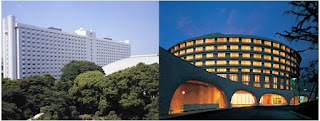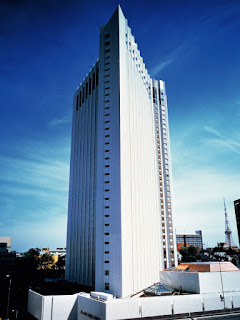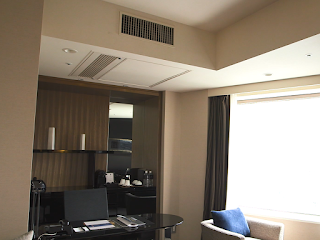Recent PAFMAC Reviews in Japan Part 5
Upgrading the air conditioning system, co-developed by the hotel and the manufacturer.
PAFMAC realizes all-year-round cooling and heating system while using 2-pipe fan coil system.
As the wave of new hotel openings continue, great effort is poured into rebranding and new brand generation to differentiate from the competitors, and therefore air conditioning unit, which provides the most fundamental comfort in guest rooms, is gaining great attention.
Mr. Ryuji Ikegami, Managing Officer of Prince Hotels, Inc. and Mr. Mikio Wakayama, President of NIPPON PMAC Co., discuss PAFMAC, which successfully converts conventional 2-pipe fan coil system into an all-year-round cooling and heating system.
Ryuji Ikegami, Managing Officer, Principal Architect & Designer, Prince Hotels, Inc.
Mikio Wakayama, CEO of NIPPON PMAC Co., Ltd.
In addition to the basic functions of air conditioning, quiet operation and energy conservation as key factors.
Moderator: To start, I heard that the new corporate HQ for Prince Hotel, Inc., “The DaiyaGate Ikebukuro”, has installed air conditioning system from NIPPON PMAC. Is the business relationship between the two companies a long-standing relationship?
Mr. Ikegami: We have had a very long business relationship with both NIPPON PMAC and its parent company Takasago Thermal Engineering Co. The two companies know Prince Hotel’s air conditioning facilities the best, so naturally we ask for their cooperation on many projects.
I believe this is all possible because of a product named PAFMAC.
Mr. Wakayama: Because of the support from our customers, we welcomed our 47th year in business. And, we began our relationship with the Prince Hotels since 2007, when we installed our PAFMAC in the Grand Prince Hotel Takanawa.
Moderator: Please elaborate on how you decided to install PAFMAC.
Mr. Ikegami: In the past, some hotels in Karuizawa and Hakone (mountain resorts in Japan), where it is cooler in temperature, did not have air conditioners even in the summer. However, due to global warming, customer needs for air conditioners have rapidly increased, and the installation of AC has become the norm in not only city hotels but also in resorts. In addition, equipment that can individually adjust the temperature and humidity depending on customer preferences has been in demand. If the hotels are new, then the infrastructure can be built-in to meet these demands, but the two-pipe fan coil system was the norm at the time for hotels.
During the in-between-seasons, customer requests for room temperature required individual service by hotel staffs. Through repeated trial and error, we sought ways to control temperature in the manner of all-year-round cooling and heating system even with the existing 2-pipe fan coil system, and then, PMAC Japan proposed us the PAFMAC system. Immediately, we put the system to test in our Grand Prince Hotel Takanawa and The Prince Hakone Lake Ashinoko.
Mr. Wakayama: Since around 1997, coincidently, we had been receiving requests to convert a 2-pipe fan coil system into an all-year-round cooling and heating system and we had begun our R&D. Initially, the Prince Hotel decided to test four units at The Prince Hakone Lake Ashinoko and actually check their usability and performance.
Mr. Ikegami: We trusted NIPPON PMAC’s technology, but since it was a new type of air conditioning unit, we wanted to test its performance and whether there were no issues with the operating noise.
Room noise is a very delicate issue for hotels since even the slightest noise at night will cause complaint from our guests, saying, “it is too loud to fall sleep”.
Moderator: Were you successful in addressing the problem of noise from the beginning?
Mr. Wakayama: In Japan, we believe operation noise is the first and most important issue to be addressed. Of course, it must be given that the system satisfies basic functions of cooling and heating, but we also emphasize quiet operation and energy conservation as an added value.
Regarding the operation noise, since PAFMAC combines 2-pipe fan coil and a heat pump, the compressor operates in addition to the fan motor, so I believe Prince Hotel was concerned.
Moderator: In hotels, some people even find the refrigerator compressor too noisy. How did PAFMAC approach the issue?
Mr. Wakayama: PAFMAC takes measures to seal the compressor installation location in the unit that will be the sound source. We sometimes hear that PAFMAC is slightly heavy due to it having a large amount of sheet metal, but that plays a role in suppressing sound transmission, and furthermore uses sound absorbing materials to suppress reverberation. In addition, the air duct system which the wind passes through uses sound deadening material to reduce noise.
Mr. Ikegami: We greatly appreciated as a hotel that a great attention is given to the silent performance in detail. I think the reason why many hotels choose PAFMAC is because the company understands the needs of Hotels and develops its system from the customers perspective.
Moderator: Please tell us about your history of introducing PAFMAC to Prince Hotels.
Mr. Ikegami: Until now, about 890 units have been delivered. Of these, Oiso Prince Hotel installed 260 units when renovating its facilities. Shinjuku Prince Hotel was installed in three phases. Since the hotel operates 24 hours, 365 days a year, it is difficult to expand the scope of the work to upgrade the air conditioning unit. Replacing the 2-pipe fan coil system with the 4-pipe fan coil system would require a large-scale construction, and the entire building would have to be closed, resulting in an extremely large sales loss. Since PAFMAC can be integrated into existing 2-pipe fan coil system, minimizing the impact on sales is a great advantage for hotels. In extreme cases, it is even possible to replace rooms one by one.
Contribution to Seibu Group’s SDGs efforts.
(Seibu Group is a corporate group centered on Seibu Holdings Co., Ltd. and Prince Hotels, Inc., with Seibu Holdings Inc. as the holding company)
Moderator: Recently, corporate attitudes toward environmental impact is under the microscope. What are your thoughts on that?
Mr. Ikegami: Regarding environmental issues, the Seibu Group is actively working on SDGs (Sustainable Development Goals). We are constantly upgrading our refrigerating machines and boilers to high-efficiency equipment, and we are constantly striving to reduce our environmental impact by promoting the use of LEDs. Air conditioning accounts for a large part of the energy consumption, so a product that can be individually controlled, such as PAFMAC, is very effective from the viewpoint of energy saving, rather than cooling or heating all units at once.
Mr. Wakayama: As a manufacturer, the idea is to provide comfort first and then improve energy-saving performance. PAFMAC principally uses energy-saving components such as a small inverter-type compressor and a DC motor. We believe we can help by not only selling our products, but continue working with the hotels to save energy, specifically by limiting the operating frequency of the compressor, among others.
Mr. Ikegami: As a hotel operator, we are promoting the introduction of watt hour meter, which shows the amount of electricity used, and magnetic flow meter, which shows the actual flow of water, so that energy consumption can be “visualized”. The air conditioning system changes the amount of energy used depending on how customers use it, so feedback from actual data to NIPPON PMAC can be used to further develop and improve their products, and we will take full advantage better products in effort to provide the most comfortable service to our hotel guests.
Mr. Wakayama: We will always consider what we can do to help Prince Hotel provide the best rooms to its guests and continue working together to develop the best products possible.
4 pipe Climate Control with 2-Pipe Systems.
Only the room installing PAFMAC needs to be out of order. Easy and quick installation. Great energy savings.



